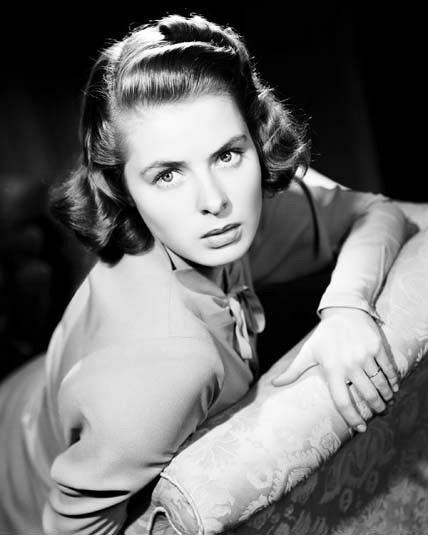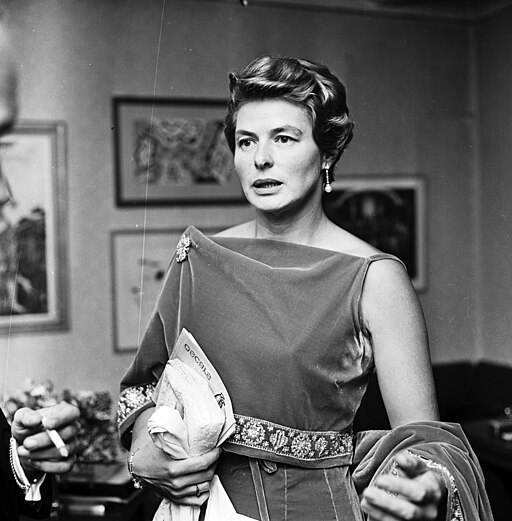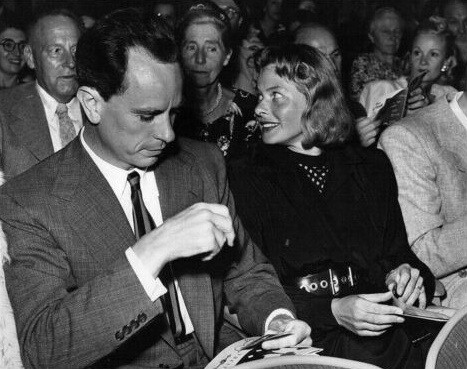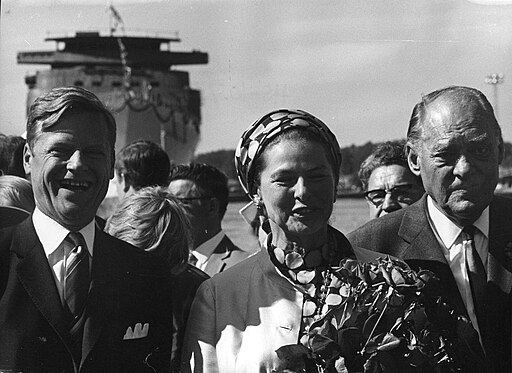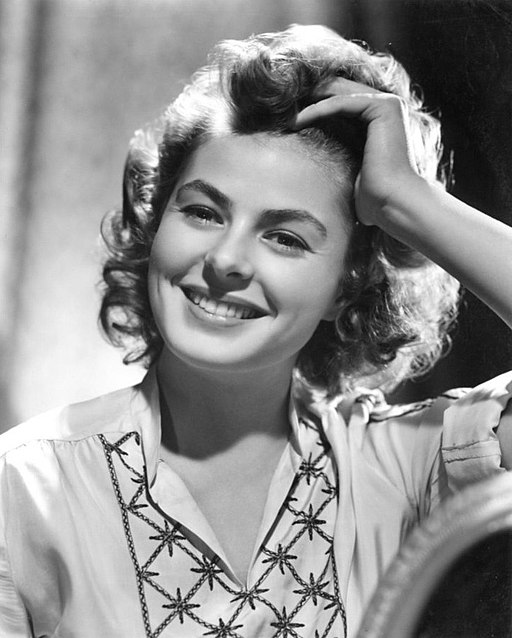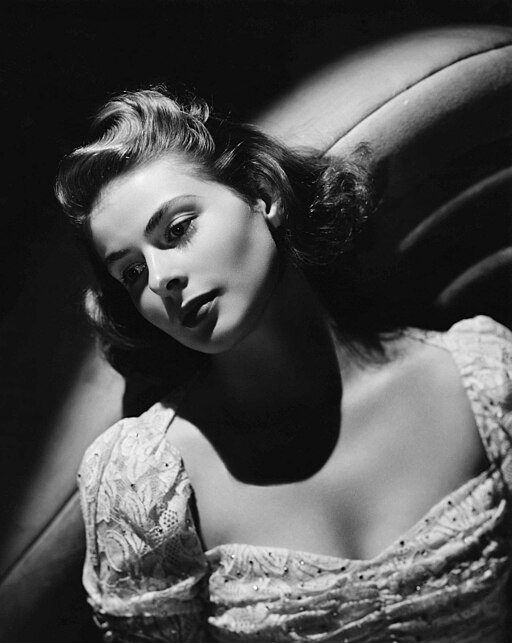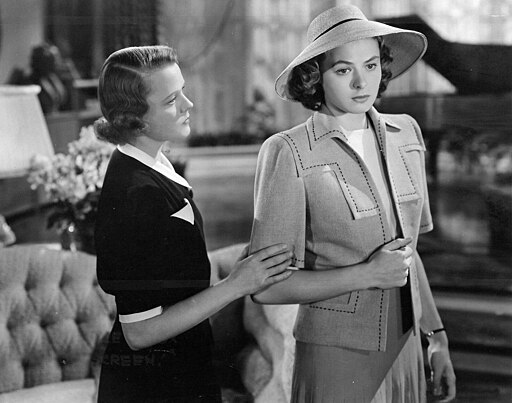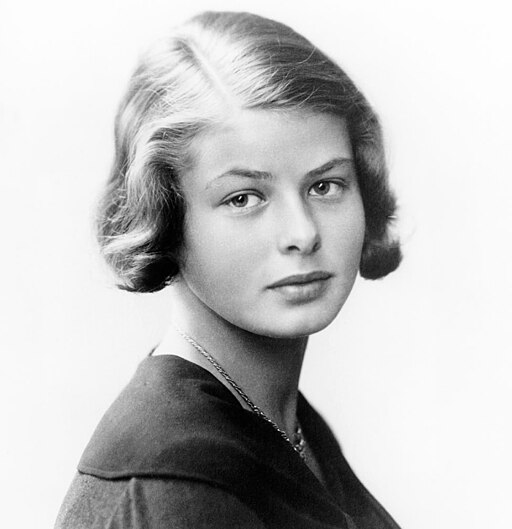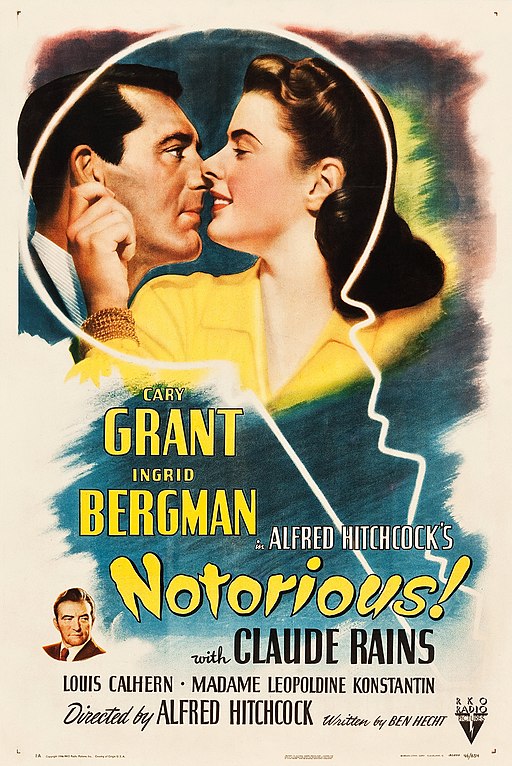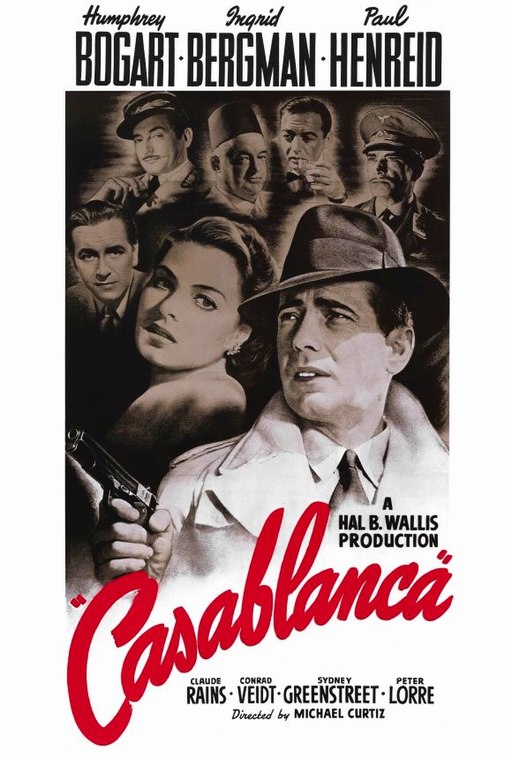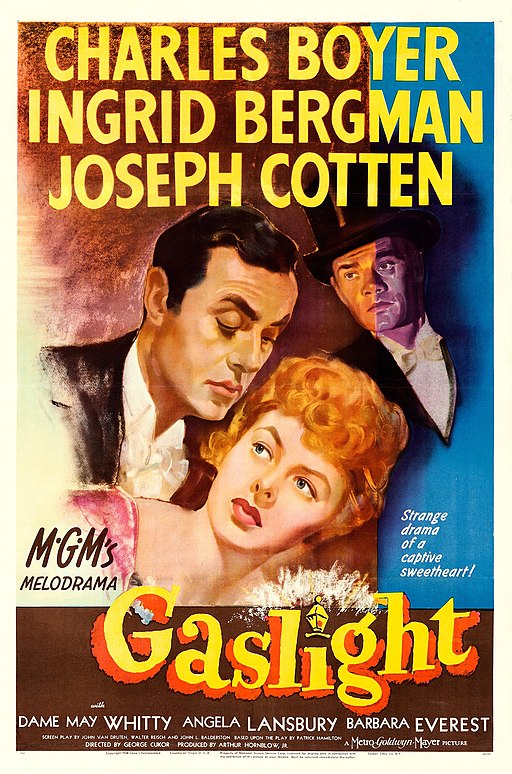Ingrid Bergman
back| Full Name | Ingrid Bergman |
| Stage Name | Ingrid Bergman |
| Born | August 29, 1915 |
| Birthplace | Stockholm, Sweden |
| Died | August 29, 1982 |
| Buried | Norra Begravningsplatsen, Stockholm, Sweden |
| Married to | Petter Lindström (1937–1950) - Roberto Rossellini (1950–1957) - Lars Schmidt (1958–1975) |
| Children | Pia Lindström - Renato Roberto Ranaldo Giusto Giuseppe ( |
| Notable films | Casablanca (1942) - Gaslight (1944) - Spellbound (1945) - Notorious (1946) - Joan of Arc (1948) - Stromboli (1950) - Anastasia (1956) |
Ingrid Bergman
“The Swedish Sphinx”
Ingrid Bergman, born on August 29, 1915, in Stockholm, Sweden, was a renowned actress known for her naturalistic acting style and profound emotional depth. Rising to fame in Swedish and German films, she made a significant Hollywood breakthrough with "Intermezzo" (1939).
Bergman became a global icon with timeless classics like "Casablanca" (1942) and "Gaslight" (1944), the latter winning her the first of three Academy Awards.
Her career faced turbulence due to a controversial personal life, notably her affair and subsequent marriage to director Roberto Rossellini. Despite this, she made a triumphant return to Hollywood with "Anastasia" (1956), earning another Oscar.
Related
Ingrid Bergman
Biography and Analysis of her Movie Career
Ingrid Bergman was born on August 29, 1915, in Stockholm, Sweden. Her early life was marked by tragedy; she lost her mother when she was just three years old, and her father passed away when she was 12. This early loss had a profound impact on Bergman, shaping her into a resilient and independent individual.
Path Towards Success
Bergman's journey into acting began at the Royal Dramatic Theatre School in Stockholm. Her natural talent was evident from her early performances. In 1932, she made her film debut in a Swedish film called "Munkbrogreven." She continued to work in Swedish and German films throughout the 1930s, quickly rising to prominence with her captivating screen presence.
Breakthrough in Hollywood
Bergman's Hollywood debut came in 1939 with "Intermezzo," a remake of her 1936 Swedish film. Her performance was a revelation, instantly propelling her to stardom. This success was followed by iconic roles in films like "Casablanca," "Gaslight," for which she won her first Academy Award, and several Alfred Hitchcock classics including "Spellbound" and "Notorious."
Marriages and Family Life
Bergman's personal life was as eventful as her professional one. Her first marriage was to Petter Lindström in 1937, with whom she had a daughter, Pia. This marriage ended amidst a highly publicized affair with Italian director Roberto Rossellini, whom she married in 1950. The couple had three children: a son, Renato, and twin daughters, Isotta and Isabella (who became a famous actress and model). The marriage ended in 1957. In 1958, she married Lars Schmidt, a Swedish producer; this marriage lasted until 1975.
Professional Comeback and Later Career
Bergman faced significant public backlash due to her affair with Rossellini, which led to a temporary exile from Hollywood. However, she made a triumphant return with the 1956 film "Anastasia," earning her second Academy Award. Bergman continued to work in both European and American films throughout the 1960s and 1970s.
Passions and Interests
Beyond acting, Bergman had a deep passion for languages and was proficient in several, including Swedish, German, English, Italian, and French. This linguistic ability helped her in transitioning between Hollywood and European cinema. She was also known for her love of music and privacy, often retreating from the public eye to spend time with her family.
Death and Legacy
Ingrid Bergman passed away on her 67th birthday, August 29, 1982, due to breast cancer. She died in London and was cremated, with her ashes taken to Sweden. Her death marked the end of an era in cinema. Bergman is remembered for her remarkable talent, her contributions to the film industry, and her courage in facing both professional and personal challenges.
Bergman's legacy lives on through her films, her contributions to the art of acting, and the barriers she broke in her international career. She remains a symbol of grace, strength, and resilience in the face of adversity.
Documentary on Ingrid Bergman:
Analysis of the Acting Style of Ingrid Bergman:
Ingrid Bergman's acting style was distinguished by its naturalism, emotional depth, and an innate ability to convey complex characters with subtlety and authenticity. Let's delve into the key aspects of her style:
Naturalism and Realism:
Bergman was known for her naturalistic approach to acting. Unlike many of her contemporaries who embraced a more theatrical style, she preferred a more subdued and realistic portrayal of her characters. This naturalism was groundbreaking at the time and contributed significantly to the evolution of acting styles in both Hollywood and European cinema.
Emotional Authenticity:
One of Bergman's most remarkable qualities as an actress was her ability to portray a wide range of emotions authentically. Whether she was playing a tormented wife in "Gaslight," a passionate lover in "Casablanca," or a conflicted woman in "Notorious," Bergman could convey the emotional depth and complexity of her characters in a way that was both profound and relatable.
Subtlety and Nuance:
Bergman's performances were often marked by their subtlety. She had a talent for conveying the inner life of her characters through small gestures, facial expressions, and a nuanced use of her voice. This subtlety allowed her to express a character's thoughts and feelings without over-emphasis, making her performances more impactful and memorable.
Versatility:
Bergman's career was characterized by a remarkable versatility. She successfully traversed various genres, from romantic comedies to psychological thrillers, and worked under the direction of some of the most renowned filmmakers, including Alfred Hitchcock and Roberto Rossellini. Her ability to adapt to different styles and challenges showcased her broad range as an actress.
Strength and Vulnerability:
A defining characteristic of many of Bergman's roles was the combination of strength and vulnerability. She often played strong, independent women who also possessed a profound emotional sensitivity. This blend of traits made her characters more multidimensional and compelling.
Chemistry with Co-Stars:
Bergman had a unique ability to establish compelling chemistry with her co-stars. This quality was especially evident in her films with Humphrey Bogart and Cary Grant, where the emotional connection between the characters added depth and believability to their relationships.
Cross-Cultural Appeal:
As a European actress who achieved success in Hollywood, Bergman brought a unique sensibility to her roles that resonated with both American and international audiences. Her European elegance and sophistication, combined with her ability to connect with the emotional core of American cinema, made her a global icon.
Memorable Quotes from Ingrid Bergman:
From Her Films
"Casablanca" (1942)
"Play it, Sam. Play 'As Time Goes By.'"
- Often misquoted as "Play it again, Sam," this line from "Casablanca" is one of the most iconic in film history.
"Gaslight" (1944)
"If I were not mad, I could have helped you. Whatever you had done, I could have pitied and protected you. But because I am mad, I hate you. Because I am mad, I have betrayed you. And because I am mad, I am rejoicing in my heart, without a shred of pity, without a shred of regret, watching you go with glory in my heart!"
- A powerful line showcasing her character's emotional turmoil and strength.
Personal Quotes
"I've gone from saint to whore and back to saint again, all in one lifetime."
- Reflecting on the public's perception of her throughout her career.
"Be yourself. The world worships the original."
- Encapsulating her philosophy of authenticity and individuality.
"I've never sought success in order to get fame and money; it's the talent and the passion that count in success."
- Speaking to her dedication and love for the craft of acting.
"Happiness is good health and a bad memory."
- A witty remark on her view of happiness.
"I do not know how to kiss, or I would kiss you. Where do the noses go?"
- A lighthearted comment that reflects her charming personality.
Reflective Quotes
"I remember one day sitting at the pool and suddenly the tears were streaming down my cheeks. Why was I so unhappy? I had success. I had security. But it wasn't enough. I was unhappy because I was not being true to myself."
- A candid reflection on the importance of self-integrity.
"Acting is a nice childish profession - pretending you're someone else and, at the same time, selling yourself."
- A succinct description of the nature of acting.
Marriages:
Ingrid Bergman's personal life, particularly her marriages, was as eventful and intriguing as her professional career. She was married three times, each union bringing its own set of complexities and contributing to her public persona. Here's an overview of her marriages:
1. Petter Lindström (1937–1950)
- Petter Aron Lindström was a Swedish neurosurgeon.
- Bergman and Lindström married in 1937, and their union lasted until 1950.
- They had one child together, a daughter named Pia Lindström, who later became a successful television journalist.
- This marriage ended amidst a highly publicized affair that Bergman had with the Italian director Roberto Rossellini.
2. Roberto Rossellini (1950–1957)
- Roberto Rossellini was a prominent Italian film director.
- Their relationship began as a professional collaboration with the film "Stromboli" (1950) and quickly turned into a romantic affair, which was scandalous at the time, especially considering both were married to others when they met.
- Bergman and Rossellini married in 1950, shortly after she gave birth to their son, Renato Roberto Ranaldo Giusto Giuseppe ("Robin") Rossellini.
- They had two more children, twin daughters Isotta Ingrid Rossellini and Isabella Rossellini. Isabella would later become a famous actress and model.
- The marriage with Rossellini ended in 1957. This relationship and the ensuing scandal had a significant impact on Bergman's career and public image, leading to her temporary exile from Hollywood.
3. Lars Schmidt (1958–1975)
- Lars Schmidt was a Swedish theatrical producer and entrepreneur.
- They married in 1958 and their relationship was seen as a stabilizing period in Bergman's life after the turbulence of her previous marriage.
- The couple divorced in 1975.
Trivia:
A] Ingrid Bergman Rose:
The Ingrid Bergman rose is a celebrated and popular variety in the world of floriculture, named in honor of the iconic Swedish actress. The Ingrid Bergman rose has won several awards, reflecting its popularity and quality as a garden plant. Among its accolades, it was awarded the ADR rose label, a prestigious German award for new rose varieties that demonstrate exceptional health and robustness.
B] Ingrid Bergman Stamps:
Swedish Postal Service Tribute
- Issued in Sweden: The Swedish postal service has issued stamps featuring Ingrid Bergman as a tribute to one of the country's most famous and beloved actresses. These stamps are a part of a series honoring notable Swedish personalities.
International Recognition
- Joint Issue with the United States: In 2015, marking the centenary of Bergman's birth, the United States Postal Service (USPS) also issued a stamp featuring Ingrid Bergman. This was part of their Legends of Hollywood series. The release was notable as it was a joint issue with Sweden – a rare occurrence in the philatelic world, highlighting her international appeal.
Design and Features
- Visual Design: The stamps typically feature iconic images of Bergman from various stages of her career. For instance, the USPS stamp featured a portrait of Bergman from the 1940s, capturing her classic Hollywood era look.
- Collector's Item: These stamps are considered valuable collector's items, especially for fans of cinema and philatelists who specialize in celebrity-themed postage stamps.
C] How Tall was Ingrid Bergman?
Ingrid Bergman was known for her statuesque presence and was relatively tall for an actress of her era. She stood at approximately 5 feet 9 inches (175 cm) tall. Her height, along with her poise and elegance, contributed to her commanding screen presence and distinguished her in many of her film roles.
Awards and Recognitions:
Academy Awards (Oscars)
- Winner
- Best Actress for "Gaslight" (1945)
- Best Actress for "Anastasia" (1957)
- Best Supporting Actress for "Murder on the Orient Express" (1975)
- Nominated
- Best Actress for "For Whom the Bell Tolls" (1944)
- Best Actress for "Joan of Arc" (1949)
- Best Actress for "Autumn Sonata" (1979)
BAFTA Awards
- Winner
- Best Foreign Actress for "Anastasia" (1957)
- Best Actress for "Murder on the Orient Express" (1975)
- Nominated
- Best Foreign Actress for "The Inn of the Sixth Happiness" (1959)
Golden Globe Awards
- Winner
- Best Actress in a Motion Picture – Drama for "Anastasia" (1957)
- Best Actress in a Motion Picture – Drama for "The Inn of the Sixth Happiness" (1959)
- Best Supporting Actress – Motion Picture for "Murder on the Orient Express" (1975)
- Best Actress in a Television Film for "A Woman Called Golda" (1982, posthumous)
- Nominated
- Best Actress in a Motion Picture – Drama for "Autumn Sonata" (1979)
Emmy Awards
- Winner
- Outstanding Lead Actress in a Limited Series or a Special for "A Woman Called Golda" (1982, posthumous)
Cannes Film Festival
- Winner
- Best Actress Award for "Stromboli" (1950)
- Best Actress Award for "Joan of Arc at the Stake" (1954)
Tony Awards
- Nominated
- Best Actress in a Play for "Joan of Lorraine" (1947)
New York Film Critics Circle Awards
- Winner
- Best Actress for "Anastasia" (1956)
Other Notable Honors
- Ingrid Bergman was awarded three David di Donatello Awards, Italy's most prestigious film award.
- She received a posthumous Lifetime Achievement Award at the 1983 Cannes Film Festival.
- In 2000, the Swedish postal service issued a postage stamp in her honor.
- The Ingrid Bergman Square in Stockholm was named in her memory.
Bergman's awards and nominations reflect her status as one of the most acclaimed actresses in the history of cinema. Her contributions to the industry were not only recognized in her lifetime but continue to be celebrated posthumously.
Significance of her Performance in “Casablanca”:
Breakthrough in Hollywood Stardom
- Global Recognition: Although Bergman had already made a name for herself in Hollywood with "Intermezzo," "Casablanca" catapulted her to international stardom. The film's immense success and enduring popularity made her a global icon.
Iconic Role
- Memorable Character: In "Casablanca," Bergman played Ilsa Lund, a role that became one of the most iconic in cinematic history. Her portrayal of Ilsa—a complex character torn between love and duty—showcased her acting range and added depth to the film's romantic and dramatic elements.
Timeless Classic
- Enduring Legacy: The film is considered a classic of American cinema, known for its timeless story, memorable lines, and the chemistry between its leads. Bergman's performance is a key component of what makes "Casablanca" a perennial favorite.
Professional Collaborations
- Working with Renowned Talents: "Casablanca" also marked Bergman's collaboration with other cinema legends, including Humphrey Bogart and director Michael Curtiz. This association further elevated her status in the industry.
Artistic Impact
- Acting Style: Bergman's natural and understated acting style in "Casablanca" was in contrast to the more theatrical performances typical of that era. This approach added a layer of realism to the film and influenced future acting styles.
Cultural Icon
- Pop Culture Influence: Bergman's role in "Casablanca" has become a part of popular culture. Phrases from the film, like "Play it, Sam. Play 'As Time Goes By,'" are often associated with her, despite common misquotes.
Career Resilience
- Surviving Controversy: Later in her career, Bergman faced significant public backlash due to her personal life. The timeless appeal of "Casablanca" helped sustain her popularity even when she was exiled from Hollywood.
In summary, "Casablanca" was not only a pivotal point in Ingrid Bergman's career, offering her international acclaim and solidifying her status as a leading actress, but it also contributed to her lasting legacy in the film industry.
Movies featuring Ingrid Bergman:
1930s
- 1935: "Munkbrogreven"
- Bergman's film debut, a Swedish comedy where she played a minor role.
- 1935: "The Count of the Old Town"
- A comedy film set in Stockholm, featuring Bergman in a supporting role.
- 1936: "Swedenhielms Family"
- A drama about a professor and his family's ups and downs.
- 1936: "Intermezzo"
- A romantic drama about a violinist who falls in love with his daughter's piano teacher, played by Bergman.
- 1937: "Dollar"
- A comedy about a businessman trying to save his bankrupt firm.
- 1938: "A Woman's Face"
- Bergman plays a facially disfigured woman, embittered by her appearance.
- 1939: "Intermezzo: A Love Story" (American version)
- A remake of her 1936 Swedish film, marking her Hollywood debut.
1940s
- 1940: "June Night"
- A drama where Bergman portrays a woman starting a new life in Stockholm after being shot by her lover.
- 1941: "Adam Had Four Sons"
- A drama about a governess who becomes part of a wealthy family.
- 1941: "Rage in Heaven"
- A psychological thriller about a love triangle and mental illness.
- 1942: "Casablanca"
- One of the most iconic films in history, set against the backdrop of World War II.
- 1943: "For Whom the Bell Tolls"
- Based on Hemingway's novel, set during the Spanish Civil War.
- 1944: "Gaslight"
- A psychological thriller where Bergman's character is driven to the brink by her manipulative husband.
- 1945: "The Bells of St. Mary's"
- A drama about a nun at a struggling school.
- 1945: "Spellbound"
- A Hitchcock film where she plays a psychiatrist protecting an amnesia patient.
- 1946: "Notorious"
- Another Hitchcock classic, involving espionage and romance.
- 1948: "Arch of Triumph"
- A drama set in pre-WWII Paris, involving a refugee doctor and a mysterious woman.
- 1948: "Joan of Arc"
- A historical epic where Bergman portrays the French heroine.
1950s
- 1950: "Stromboli"
- A drama about a Lithuanian refugee, marking Bergman's first collaboration with Roberto Rossellini.
- 1952: "Europe '51"
- A film about a woman's spiritual transformation following her son's death.
- 1954: "Fear"
- A psychological drama about a woman blackmailed for a past affair.
- 1954: "Journey to Italy"
- A drama about an English couple's marriage crisis during a trip to Italy.
- 1956: "Elena and Her Men"
- A romantic comedy set in France.
- 1956: "Anastasia"
- A drama about an amnesiac woman claimed to be the lost Russian princess.
- 1958: "The Inn of the Sixth Happiness"
- The story of a British missionary in China.
1960s
- 1961: "Goodbye Again"
- A romantic drama about a middle-aged woman's affair with a younger man.
- 1964: "The Yellow Rolls-Royce"
- An anthology film where she plays a woman involved in an affair.
- 1964: "The Visit"
- A drama about a wealthy woman seeking revenge on her former lover.
- 1966: "Stimulantia"
- A film consisting of short segments, including one featuring Bergman.
- 1967: "Cactus Flower"
- A comedy about a dentist who pretends to be married to avoid commitment.
- 1969: "The Human Voice"
- A short film where Bergman plays a woman losing her lover to another woman.
1970s
- 1973: "From the Mixed-Up Files of Mrs. Basil E. Frankweiler"
- A family film about two siblings running away to a museum.
- 1974: "Murder on the Orient Express"
- A famous detective film where she played a Swedish missionary

